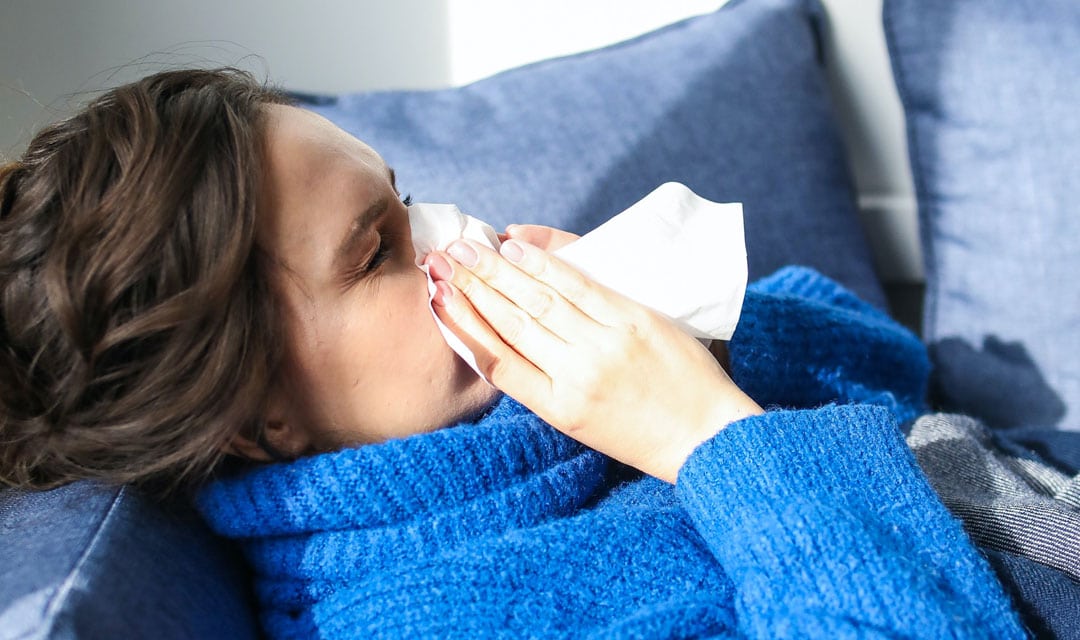The average adult experiences two to four colds a year, and children catch about six or seven, so chances are someone in your home will be sick during the winter months. While rest and doctor’s orders are essential for recovery, your dental health is also paramount. Your mouth is constantly booming with both good and bad bacteria, and an illness can throw it off balance. Harboring too many harmful bacteria can slow your recovery time.
Additionally, it is challenging to keep up with your routines when you are sick, and many people neglect their oral hygiene to some degree while under the weather. But this is a critical time to be diligent about your dental health. Your teeth are especially vulnerable when you are sick. Here are some tips for getting them through a seasonal cold or flu.
Don’t Slack on Brushing And Flossing
If you are a current orthodontic patient, you already know the importance of regular brushing and flossing. This does not change because you are sick – in fact, it becomes even more important as bacteria builds in your mouth more rapidly. Continue to brush your teeth at least twice a day, and floss at least once daily. Wash your hands before and after to avoid transferring germs from your hands to your mouth and back. An oral rinse can add an extra layer of protection. Dozens of good options exist – any with an ADA Seal of Acceptance will be safe and effective.
Choose Sugar-Free Cough Drops and Syrups
Though cough drops are medicinal, most contain as much sugar as a piece of candy. It is best to opt for sugar-free varieties, especially if you use them often. (Cough drops are OK if you wear braces, as long as you don’t chew them.) Cough syrups are similarly high in sugars that will damage the teeth. If you cannot find a suitable sugar-free option, rinse after swallowing the medication to wash much of the sugar out of the mouth.
Change Your Toothbrush
Germs from when you were sick can remain on your toothbrush even after recovering. For example, the flu virus can survive on a moist surface for three days. You build immunity after being sick, so your chances of reinfection from your toothbrush are low. However, brushing germs back onto your teeth might seem less than desirable. Remember that the American Dental Association recommends replacing your toothbrush every three to four months (more frequently if you are wearing metal braces), so it might be time to toss it anyway. If you don’t want to swap brushes just yet but want a germ-free experience, you can soak the toothbrush’s head in boiling water.
Stay Hydrated
Doctors recommend that you drink plenty of fluids when you are not feeling well, as do dentists and orthodontists. One of the reasons for this is to prevent dry mouth. Your saliva plays a crucial role in slowing the buildup of bacteria. When you don’t produce enough saliva, your teeth are at greater risk of developing cavities. You are more susceptible to dry mouth when congested because you breathe from your mouth instead of your nose. The medications you might be taking for a cold or flu–such as antihistamines, decongestants, or pain relievers–also can inhibit saliva production. Additionally, you tend to speak and swallow less when you’re sick, allowing bacteria to multiply and settle more quickly.
Don’t Share a Toothbrush
For hygiene purposes, you should never share your toothbrush. It’s especially true if you are sick. If two people use the same toothbrush, they share more than just saliva. The infectious microorganisms from your mouth will transfer via the toothbrush. Be aware that children should not swap bristles with their siblings.
Rinse Rather Than Brush After Vomiting
If you have the stomach flu and are vomiting, the acids coming in contact with your teeth are highly destructive. However, while you might assume brushing immediately after getting sick is your best defense, it is better to wait. If you brush too soon, you distribute the acid over your teeth. Instead, swish with water. This will help wash away some of the acid and prevent it from sitting on your teeth. You also can rinse with a solution of water and one teaspoon of baking soda to help neutralize the acid. Brush about 30 minutes later.
Add Salt to Your Hygiene Routine
Gargling with salt water will help kill germs in the throat and mouth, expediting the healing process. Mix a ½ teaspoon of salt into a cup of warm water, gargle the mixture for a few seconds, then swish it around your mouth for about 10 seconds. Spit out the rinse completely, as swallowing the salt can contribute to dehydration. You can repeat this up to four times per day for up to two weeks.
Make Mouth-Healthy Food & Beverage Choices
Choosing raw, non-starchy, crunchy fruits and vegetables to snack on while you are sick can help provide you with the nutrition you need to recover and keep teeth clean by allowing to remove plaque. (If you wear braces with brackets and wires, this option is not the best for you since crunchy foods are on your avoid list.) Chasing your meals with water is always the best option for your dental health. However, while sick, you might need beverages that help replenish electrolytes. Consume sports drinks sparingly, or choose ones with reduced or zero sugar. If you enjoy a cup of hot tea, sweeten it lightly with honey instead of sugar.



